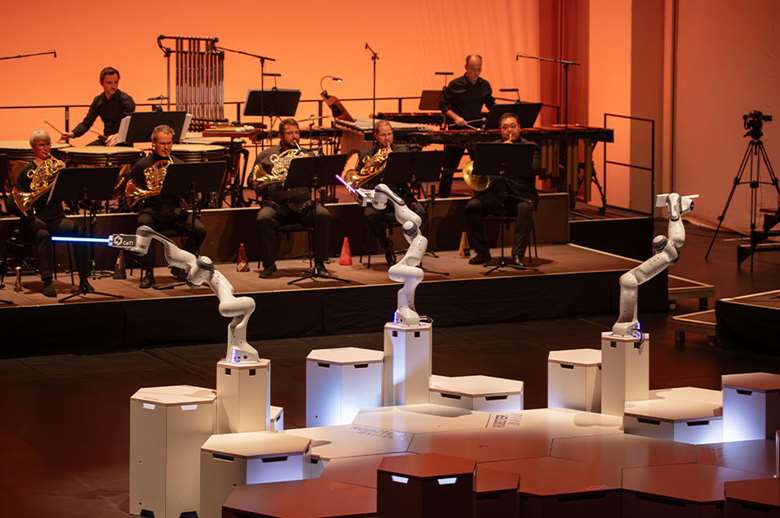The Long View | Enough with the robot performances
Andrew Mellor
Tuesday, December 10, 2024
If there’s one domain in which robotics prove woefully inadequate, it’s the performance of live music. Now we know, asks Andrew Mellor, can we please stop?

If have one wish for 2025 – beyond world peace and the re-funding of large-scale touring opera in England – it’s that I won’t encounter a single news story about a robot conducting an orchestra or playing an instrument.
Wishful thinkers might suspect we have reached saturation point anyway. In the months prior to writing this month’s column there was a glut of these monotonous stunts. First we heard a curiously configured Dresdner Sinfoniker being conducted by three robots, with the promise that humans couldn’t possibly have managed the task.
Really? Humans would have managed just fine actually – providing there were three of them too. The Los Angeles Philharmonic proved as much back in 2019. At its centenary concert, the orchestra performed a piece titled From Space I Saw the Earth by the Icelandic composer Daníel Bjarnason in which the musicians divide themselves itself into three groups, each of which is marshalled by a conductor who must click in and out of sync with their two colleagues (actually a touch more sophisticated than what the robots did in Dresden, and executed with a little more conviction). I’d have been impressed by the Dresden stunt if one robot conductor could have managed to do what three human ones already had five years previously. Isn’t the point of robots, that they go one better than us?
Some weeks later we heard the Malmö Symphony Orchestra in Sweden play a cello concerto by Jacob Mühlrad (pictured below) in which the conductor was a human but the soloist was a robot. I should have gone to the concert, as it fell on my patch. But it just so happened to clash with another performance on the same evening that I had a sneaking suspicion might prove more creatively fulfilling.

 On the evidence of a YouTube clip of the Malmö performance, I suspected right. Rarely I have I heard a solo string instrument emit such a bland, arid, characterless noise – certainly not when played by an adult professional. At best, the robot cellist sounded like a hesitant beginner, but that would credit it with some sense of humanity, of which it sounded entirely bereft as it juddered from one note to the next like a mechanical vending machine locating a Twix. The music itself is poor, but at least when the strings of the Malmö Symphony Orchestra itself start to play, you’re struck by humanity in the sound. That’s what ensembles of living musicians tend to bring to the table.
On the evidence of a YouTube clip of the Malmö performance, I suspected right. Rarely I have I heard a solo string instrument emit such a bland, arid, characterless noise – certainly not when played by an adult professional. At best, the robot cellist sounded like a hesitant beginner, but that would credit it with some sense of humanity, of which it sounded entirely bereft as it juddered from one note to the next like a mechanical vending machine locating a Twix. The music itself is poor, but at least when the strings of the Malmö Symphony Orchestra itself start to play, you’re struck by humanity in the sound. That’s what ensembles of living musicians tend to bring to the table.
I understand the tantalising technical challenge these machines pose for their creators; the idea that if a robot can direct 100 musicians in the performance of a piece of music, then it has somehow proven itself capable of straddling the divide between art and science and is therefore one step away from being able to empathise, romanticize and reflect. The trouble is, the robots rarely seem able to get much beyond the low bar of comprehending a musical pulse, which puts them in the same bracket of technological achievement as the nineteenth-century metronome. The first thing anyone learns about conducting is that it’s about infinitely more than keeping time. It’s about heart, soul, storytelling, life experience, real-time listening, spontaneity, emotional intelligence and a whole lot more – all the qualities, in other words, that separate us humans from the machines.
As for the robots, they are clearly not improving. I remember thinking back in 2008, when the Detroit Symphony Orchestra was conducted by its ‘spaceman’ robot, that the performance lacked any sense of drive or authenticity. Ditto in 2017 when a robot conducted an orchestra in Pisa, the contraption ill-advisedly choosing a piece in 3-time as if to prove beyond doubt that it was a stranger to the concept of dance. Then we had the South Korean bot maestro in 2023 – another master-class in how not to communicate with orchestral musicians. With 2024’s literal embarrassment of robotic riches, enough is enough, surely?



